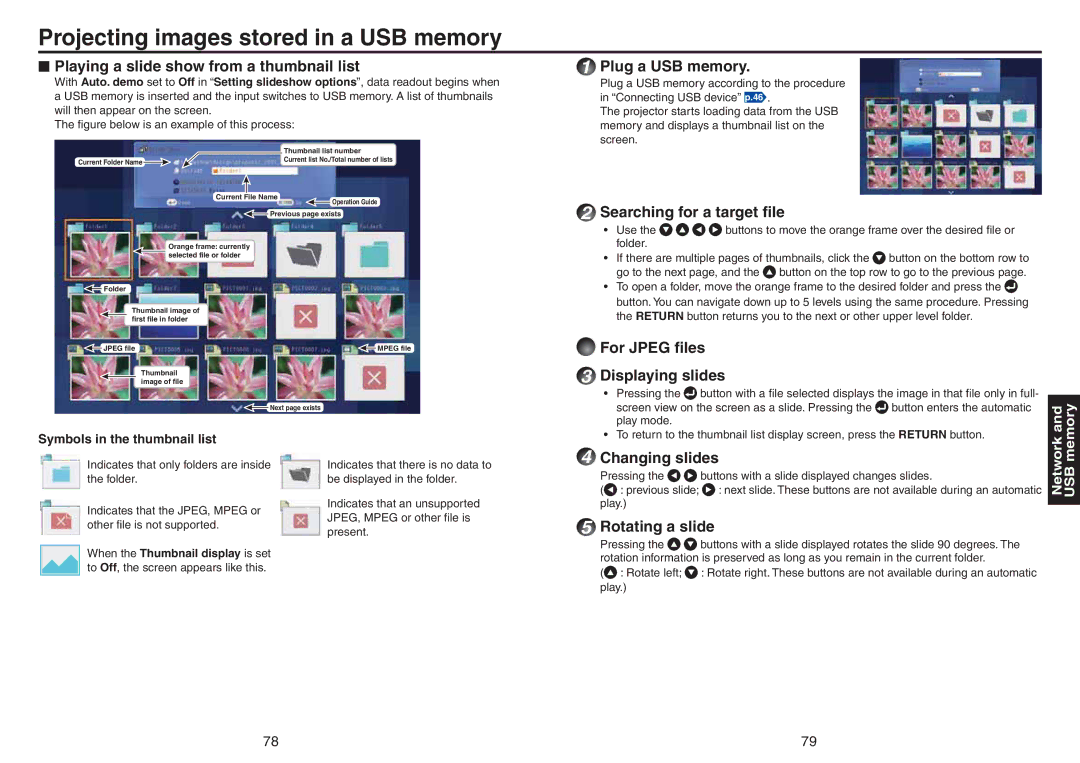
Projecting images stored in a USB memory
■Playing a slide show from a thumbnail list
With Auto. demo set to Off in “Setting slideshow options”, data readout begins when a USB memory is inserted and the input switches to USB memory. A list of thumbnails will then appear on the screen.
The figure below is an example of this process:
| Thumbnail list number |
Current Folder Name | Current list No./Total number of lists |
|
Current File Name
Operation Guide
![]() Previous page exists
Previous page exists
Orange frame: currently selected file or folder
![]() Folder
Folder
Thumbnail image of first file in folder
JPEG file | MPEG file |
Thumbnail image of file
![]() Next page exists
Next page exists
Symbols in the thumbnail list
1Plug a USB memory.
Plug a USB memory according to the procedure in “Connecting USB device” p.46 .
The projector starts loading data from the USB memory and displays a thumbnail list on the screen.
2Searching for a target file
•Use the ![]()
![]()
![]()
![]() buttons to move the orange frame over the desired file or folder.
buttons to move the orange frame over the desired file or folder.
•If there are multiple pages of thumbnails, click the ![]() button on the bottom row to
button on the bottom row to
go to the next page, and the ![]() button on the top row to go to the previous page.
button on the top row to go to the previous page.
•To open a folder, move the orange frame to the desired folder and press the ![]() button. You can navigate down up to 5 levels using the same procedure. Pressing the RETURN button returns you to the next or other upper level folder.
button. You can navigate down up to 5 levels using the same procedure. Pressing the RETURN button returns you to the next or other upper level folder.
 For JPEG files
For JPEG files
3 Displaying slides
• Pressing the | button with a file selected displays the image in that file only in full- | |
screen view on the screen as a slide. Pressing the | button enters the automatic | |
play mode. |
|
|
• | To return to the thumbnail list display screen, press the RETURN button. | and memory |
4 Changing slides | ||
Indicates that only folders are inside the folder.
Indicates that the JPEG, MPEG or other file is not supported.
When the Thumbnail display is set to Off, the screen appears like this.
Indicates that there is no data to be displayed in the folder.
Indicates that an unsupported JPEG, MPEG or other file is present.
Pressing the | buttons with a slide displayed changes slides. | Network USB |
( : previous slide; | : next slide. These buttons are not available during an automatic |
play.)
5Rotating a slide
Pressing the ![]()
![]() buttons with a slide displayed rotates the slide 90 degrees. The rotation information is preserved as long as you remain in the current folder.
buttons with a slide displayed rotates the slide 90 degrees. The rotation information is preserved as long as you remain in the current folder.
(![]() : Rotate left;
: Rotate left; ![]() : Rotate right. These buttons are not available during an automatic play.)
: Rotate right. These buttons are not available during an automatic play.)
78 | 79 |
